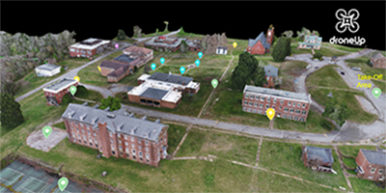Drones tested for emergency medical deliveries
Virginia Beach's DroneUp partnered with Center for Innovative Technology in April test for state government
Drones tested for emergency medical deliveries
Virginia Beach's DroneUp partnered with Center for Innovative Technology in April test for state government
The sky’s the limit when it comes to COVID-19-related solutions.
After being approached by the state government, the Herndon-based Center for Innovative Technology (CIT) partnered with Virginia Beach-based DroneUp to test how drones can assist medical professionals in delivering test samples and personal protective equipment in no-contact, emergency situations, DroneUp announced this week.
“Our response to [the request from the state] at first was, ‘We don’t know, but there’s only one way that we can find out,'” DroneUp Training Director Brendan Stewart said.
Although DroneUp’s equipment is typically used for data collection and other flight services, CIT and DroneUp began testing in early April how the companies’ combined technology could adapt to emergency situations. The tests were conducted in partnership with UPS’s drone delivery subsidiary, UPS Flight Forward, and Ohio-based drone company Workhorse Group Inc.
“I am encouraged to see so many private sector partners stepping up and thinking innovatively as we work together to combat COVID-19,” Gov. Ralph Northam said in a statement. “Drones can be an important way to deliver medical supplies while people stay home to adhere to our social distancing guidelines.”
In October 2019, UPS Flight Forward was the first drone airline to receive Part 135 certification from the Federal Aviation Administration , and it’s working to expand drone delivery service among hospitals, campuses, residences and commercial properties.
“We’ve proven through ongoing commercial drone delivery programs that effective drone delivery of medical products is faster than conventional ground-based transportation,” Scott Price, UPS chief strategy and transformation officer, said in a statement. “Drones offer a low-touch option for delivery of lab specimens and medical products that could make a significant impact in an urgent response application.”

The organizations developed a testing site at the former Saint Paul’s College site in Lawrenceville. The companies ran tests that increased in difficulty as the days went on. Out of 103 “drops” — or tests — DroneUp was able to successfully deliver 100 packages to partner organizations that had stations set up around the 55-acre campus, Stewart said.
“Much to our surprise in developing these test scenarios, not only could we do it effectively, but our performance was really quite incredible,” Stewart said. “We think that this is something that in an emergency situation could actually be scaled and actually be usable with current technology and current regulations.”
DroneUp started with a control test, having drone pilots drop the packages on a large, open area with few hazards. But as the tests progressed, pilots had to maneuver around obstacles, including buildings, power lines and vehicles.
“We had to set up an air traffic control solution to keep the drones from hitting each other and organize them effectively to make those drops happen,” Stewart said. “The interesting thing for us is that as the situations got more difficult and more dynamic, our pilots were able to adapt to those very rapidly to make the deliveries happen.”
Now that the drones have successfully been tested, the companies are working on a white paper to be sent to The White House with recommendations for best practices and a blueprint for how other organizations and agencies can deploy similar projects.
The drones won’t be deployed by Virginia’s state government unless there’s an emergency situation in which it’s necessary, Stewart said. But the company has 10,000 pilots nationwide that are ready to be used at any time for emergency medical deliveries related to COVID-19, he added.
“The exercise in Lawrenceville demonstrated our ability to pivot and adapt to the needs of the market really, really quickly, Stewart said. “We hope we don’t have to use it, but we do have that capability in our back pocket if we need to.”
Subscribe to Virginia Business.
C


















